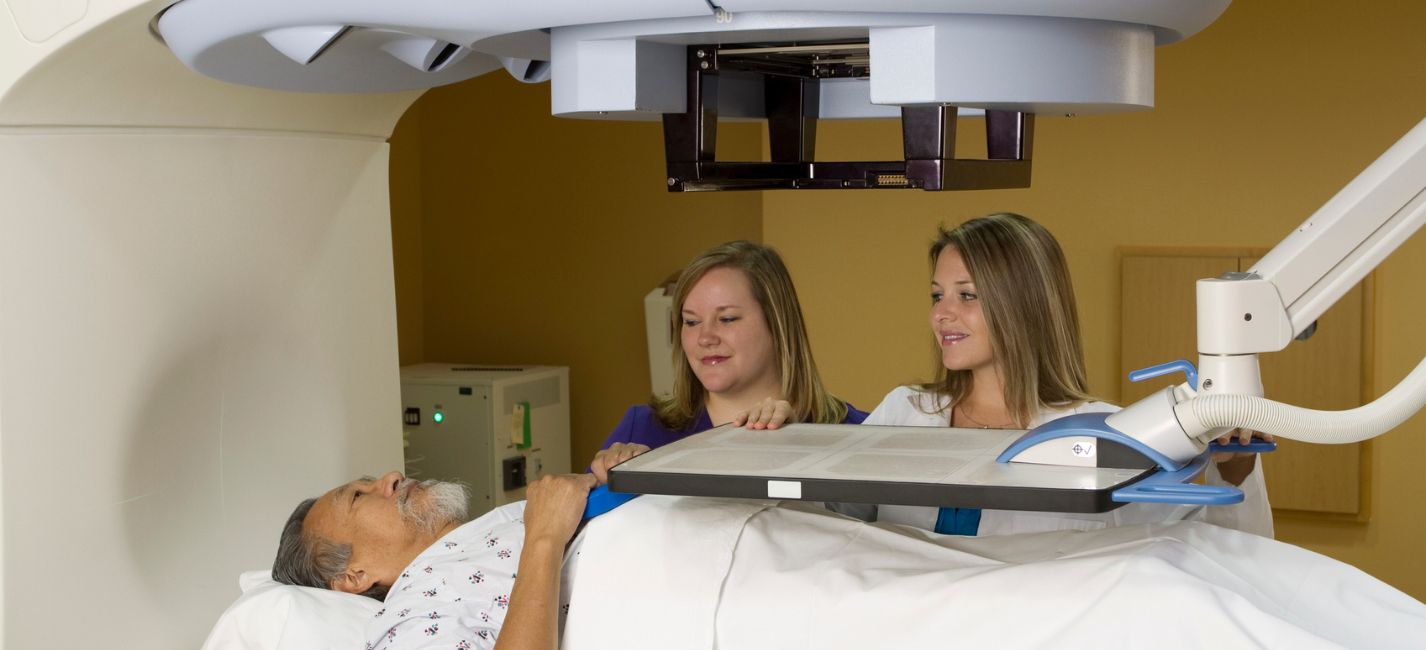Newly Diagnosed Prostate Cancer Patients
What’s Next for Patients Diagnosed with Prostate Cancer?
If you've recently been diagnosed with prostate cancer, you and your family are probably trying to decide what’s next. With several approaches to treatment available, it’s normal to have questions about which is best for you and when to begin.
Fortunately, prostate cancer often progresses slowly — giving men enough time to explore their treatment options, assess the advantages and disadvantages of different paths, and even seek a second opinion after receiving their initial treatment plan.
What Kind of Doctor Treats Prostate Cancer?
We recommend that newly diagnosed prostate cancer patients see an oncologist who specializes in prostate cancer before deciding whether to have surgery. An oncologist is best suited to determine the most effective treatment approach for you. For a prostate cancer diagnosis, it’s common to meet with both a medical oncologist and a radiation oncologist. This is because radiation is often used as a primary treatment or in combination with surgery before considering other options.
Our prostate cancer doctors will provide you with all the necessary information to make an informed decision about treatment. If other specialists, such as a urologic surgeon, are required, they will be involved early in the treatment process to discuss your specific needs. Together, we will develop a personalized treatment recommendation and determine the appropriate timing for each type of treatment.
Watch the video below to learn more about choosing a cancer care team.
The Importance of a Second Opinion on Prostate Cancer Treatment
You might have received a prostate cancer diagnosis from your urologist or another physician. It is important to know that most urologists are familiar with treating prostate cancer using surgery. If their specialty is not prostate cancer treatment specifically, it would be best to discuss your treatment options with an oncologist – a doctor that specializes in cancer treatment – before making a treatment decision.
Second opinions help determine the best treatment plan for you
There are several different approaches to prostate cancer treatment. An oncologist can provide you with a second opinion on treatment options after discussing the urologist’s recommendation. You can also come to see our prostate cancer specialists after consulting with another cancer center so you can compare your options. Most insurance companies cover second opinion appointments.
Most prostate cancer patients have time to get second opinions
Based on the prostate cancer’s stage, the best next step might be to wait to begin treatment. An oncologist may recommend an “active surveillance” or “watchful waiting” approach if cancer is found at an early stage. Each case is different, and if you have any doubt about the treatment plan that’s best for you or if you want to determine if the suggested treatment plan is what a cancer specialist would also suggest, it would be best to get a second opinion.
Second opinions help find a cancer treatment team you feel confident with
Getting a second opinion helps you understand the different treatment options and allows you to meet other treatment teams. It's important to choose the team that makes you feel confident and comfortable. Conversations with the cancer care team should be easy to follow. If they're not, consider talking to another group until you find one you're comfortable with.
The oncologists at Compass Oncology in Portland and Vancouver are available for second opinions to help you find the best treatment options for you.
Understanding Prostate Cancer

How Will We Determine Which Treatments Are Best for Me?
Most likely, you've already had some tests done, including a biopsy, blood tests, scans, and other tests that can help the oncologist understand your prostate cancer stage or how advanced it is and its growth rate.
The oncologist will recommend a treatment plan based on this information and your overall health. Sometimes, a combination of treatments is suggested to make sure all cancer cells have been removed. It's important to ask questions and understand each treatment option's purpose and potential side effects.
If your treatment will begin with active surveillance, discuss how often you need to come back for checkups. Then, be sure you go to the appointment!

Which Prostate Cancer Treatments Will I Receive?
There are several common treatments for prostate cancer available today, including:
- Active surveillance, also known as watchful waiting
- Radiation therapy, which can be external beam or internal brachytherapy
- Hormone therapy
- Surgery to remove the prostate
- Chemotherapy, mainly for advanced-stage prostate cancer
- Targeted therapy, if biomarker testing indicates its effectiveness
It's important to note that surgery to remove the prostate is not always necessary. And you don’t necessarily need every treatment type listed above. For men with early-stage prostate cancer, an active surveillance approach may be recommended before considering other treatments.
Should You Consider a Prostate Cancer Clinical Trial?
The cancer specialists at Compass Oncology participate in prostate cancer research which brings new treatments to patients in the Portland-Vancouver area and beyond. Research trials are available at all our locations, but specific criteria must be met for participation. To find out if there is a trial suitable for you, discuss it with your oncologist.
Will My Prostate Cancer Treatment Be Paid for By Insurance?
Cancer treatment is expensive. After a prostate cancer diagnosis, request a full description of your medical benefits from your insurance provider. Bring that with you to your first appointment. During your first visit, you’ll spend some time with the Compass Oncology patient benefits specialist. They will know how to help you with gaps in coverage for prescriptions or other concerns that many patients have related to paying for cancer treatment.
Preparing for Your First Appointment
During your first meeting with the prostate cancer specialist, they will evaluate what has already been done and may request a few more tests before recommending a treatment plan. Usually, additional testing is needed to see if the prostate cancer has spread or grown outside of the prostate.
You’ll receive a lot of information in a short period of time. Make sure to bring a notebook to take notes and bring a friend or loved one along to provide support, ask questions, and help take notes.
Questions to Ask Your Prostate Cancer Doctor
You'll probably have to wait at least a few days between your diagnosis and your oncology appointment. You and your loved ones will likely spend a lot of time discussing your prostate cancer diagnosis and researching the internet for what you might hear in the appointment.
As you go through your research process, write down any questions that come up so you remember to ask. Examples of questions may include:
- Does my prostate cancer require immediate treatment?
- If it does, what are my treatment options?
- Are there treatment side effects?
- Will there be long-lasting effects on the bladder or rectum as a result of treatment?
- How long does treatment last?
- Will I need to have prostate cancer surgery?
- Are there activities I should avoid or add to my routine?
- What should my diet consist of?
- Can I continue taking my supplements? Should I add any additional supplements?
- Will I still visit my primary care doctor?
- Are there prostate cancer clinical trials I should consider?
- How likely is my cancer to come back after treatment?
- Should my family get genetic testing?
Prostate Cancer Doctors Caring for Patients in Portland-Vancouver
Are There Support Resources for Me or My Loved Ones?
We hope you will turn to the Compass Oncology team of prostate cancer doctors in Portland and Vancouver as your primary resource for assistance during this challenging time. Our team of cancer specialists includes doctors, nurses, financial experts, and social support. They are experienced in helping patients work through the impact on you and your family’s daily lives.
Compass Oncology offers support programs, including a monthly Us TOO Prostate Cancer Support Group at the Rose Quarter location for prostate cancer survivors and their loved ones.
You can also find a list of support groups that many patients find invaluable during your cancer treatment process and even after treatment is complete. We hope you find a group that you enjoy meeting with and take advantage of their experiences to assist and encourage you.
Prostate Cancer Treatment in Portland-Vancouver
We provide the latest prostate cancer treatments to patients at our cancer centers in Tigard, Portland, OR, and Vancouver, WA. Choose one that's convenient for you to request a consultation.
